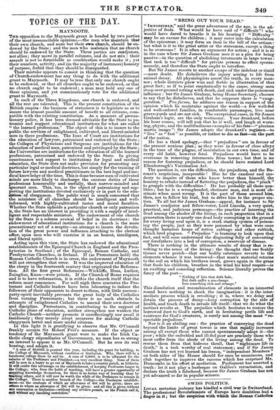TOPICS OF THE DAY.
MAYNOOTH.
TEE opposition to the Maynooth grant is headed by two parties of the most irreconcilable opinions,—the men who maintain that their own church, and none but their fern church, should be en- dowed by the State ; and the men who maintain that no church should be endowed by the State. These parties are coadjutors, not allies; they move in parallel columns, and do not mix : their assault is not so formidable as combination would make it ; yet their numbers, activity, and (in the majority of instances) honesty of purpose, forbid that they should be disregarded. Their mistake appears to consist in thinking that the question of Church-endowment has any thing to do with the additional grant to Maynooth. It may be true that only one church ought to be endowed, or that all churches ought to be endowed, or that no church ought to be endowed ; a man may hold any one of these opinions, and yet .conscientiously vote for the additional grant to Maynooth.
In each of the Three Kingdoms, one church is endowed, and all the rest are tolerated. This is the present constitution of the British empire : the business of statesmen is to legislate so as to insure the utmost possible amount of benefit to all citizens, com- patible with the existing constitution. As a measure of precau- tionary police, it has been deemed advisable for the State to pa- tronize and support educational institutions for what are called " the learned professions." The object of this is to insure to the public. the services of enlightened, cultivated, and liberal-minded men in these professions. The Inns of Court are institutions for -tilt education of lawyers, patronized and endowed by the State ; the Colleges of Physicians and Surgeons are institutions for the education of medical men, patronized and privileged by the State ; the Universities are institutions for the education of all the learned professions, patronized and endowed by the State. In giving countenance and support to institutions for legal and medical -education, the State does not make provision for promoting any particular legal or medical doctrines, but simply for the training of future lawyers and medical practitioners in the best legal and me- dical knowledge of the time. This is done because men of cultivated Elinds are more likely to discharge the onerous duties of these professions honourably and usefully, than narrow-minded and ignorant men. This, too, is the object of patronizing and sup- porting the institutions devoted exclusively or in part to the edu- *mien of clergymen. The public :weal is much concerned that the ministers •of all churches should be intelligent and well- informed, with highly-cultivated tastes and moral faculties. Whether the State upholds a particular church or only patronizes it, the State has an interest in providing it with a supply of intel- ligent and respectable ministers. The endowment of one church by the State is a solemn avowal of belief in its doctrines : the endowment of educational institutions for a church is the mere precautionary act of a sceptic—an attempt to insure the devolu- tion of the great power and influence attaching to the clerical office, upon men who will exercise it in an honest, intelligent, and liberal spirit.
Acting-upon this view, the State has endowed the educational establishments of the Episcopal Church in England and the Pres- byterian in Scotland ; of the Episcopal, Roman Catholic, and Presbyterian Churches, in Ireland. If (as Protestants hold) the Roman Catholic Church is in error, the endowment of Maynooth will not strengthen that error. It was the improved education of the clergy in the fourteenth century that originated the Reforma- tion. All the first great Reformers—Wickliffe Huss, Luther, Zuinglius, Knox—were priests. If the Church Of Rome requires and is to have reformation, it is within the church itself that the reform must commence. For well nigh three centuries the Pro- testant and Catholic leaders have been labouring to induce the followers of their opponents to desert to them, with little success : party-spirit inevitably prevents the great body of the Catholics from turning Protestants ; but there is no such obstacle to attempts of enlightened Catholics to amend their own doctrine and discipline. Protestants, in contributing to the support of Catholic plans of education, neither strengthen nor weaken the Catholic Church—neither promote it unreflectingly nor assail it insidiously ; they merely adopt measures for making Catholic clergymen better and more useful citizens.
In this light it is gratifying to observe that Mr. O'Connell frankly accepts Sir Robert Peel's measure. If the object or tendency of the Maynooth grant were to make the Irish Ca- tholic clergy stipendiaries of Government, no man has so strong an interest to oppose it as Mr. O'Connell. But he sees its real bearing,- and adopts it.
"A sum of 30,0001. is granted this year, including the grant for building, to the College of. Mavnootb, without condition or limitation. Why, there will 13C a handsome college ihere by and by. A sum of 6,000/. is to be allocated for the salaries of the Professors and President,—a very excellent thing. None of them will be now in a hurry to out of Maynooth to take a country parish, as hitherto. It will confer this advantage on the establishment, of keeping Professors longer in the College; who, from the habit of teaching, will have a greater opportunity of acquiring knowledge themselves, for there is no better way- of learning than by teaching others, and it will now be worth the while of the Professors to remain in the College. There is another branch of the College—the Dunboyne establish- ment—to the students of which an allowance of 401. will be given; there are others to whom an allowance of 20/. will be ev.en: and all this isgiven without any reservation or limitation—without any arritliv posies, as the French call, it And without any insulting restriction."


























 Previous page
Previous page